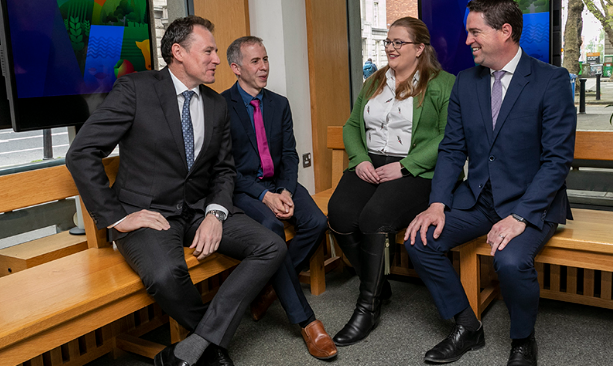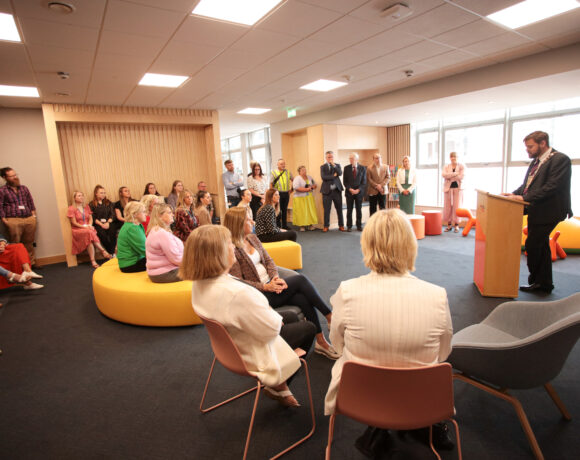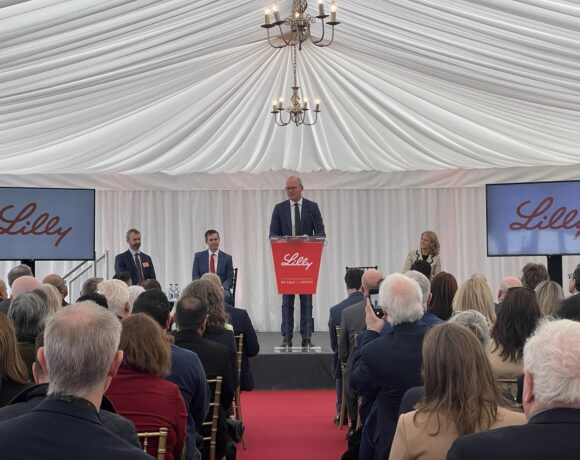Minister for Agriculture, Food and the Marine, Charlie McConalogue, and Minister of State with special responsibility for research and innovation, Martin Heydon, announced a world-first scientific breakthrough that can enable reducing methane from the Irish cattle herd through animal genetics.
This will be possible because of the publication of methane evaluations which will enable breeding programs to reduce daily methane emissions in beef cattle.
The research to underpin this is a result of a €3 million project ‘GREENBREED’, funded by the Department of Agriculture, Food and the Marine. The project has led to the publication of the world’s first national genomic evaluations for methane emissions in Irish beef cattle.
Collaborative research, involving Teagasc, Southeast Technological University, Munster Technological University and ICBF, found:
- Large differences in daily methane emissions between animals fed the same diet, with 11% of these differences being traced to genetic differences.
- The 20% highest emitting animals genetically are expected to emit 30% more methane per day compared to the 20% lowest emitting animals.
The work indicates that breeding programs to reduce methane emissions will be effective for selecting low-emitting livestock, especially when undertaken in tandem with the national genomic evaluations, such as the age at slaughter evaluations released in 2022.
Commenting on this important scientific breakthrough, Minister McConalogue said, “I believe we are standing on the precipice of a major breakthrough that will be a game changer in our drive to reduce agricultural emissions. I am excited to make this announcement which is a tangible output from significant investment by the department’s research programme towards innovative and collaborative research into breeding strategies. Science is the ace up our sleeve in reaching our climate targets and we are being strategic in our approach to backing credible and practical science.”
“The implementation of a low methane emitting breeding programme has significant potential to harness the genetic variation for methane emissions that exists within the national herd, This, in turn, will bring about permanent and cumulative reductions in the methane output of future generations of livestock. The results of the research also highlight the potential to breed more environmentally sustainable animals, while at the same time, not having a negative impact on the animal’s performance and profitability.”
Minister Heydon said, “the extensive, ground-breaking research conducted as part of the department funded GREENBREED project represents a global-first for the Irish beef sector. It will help us to reduce methane emissions from beef cattle in a way that is both economically and environmentally sustainable. This announcement underlines the ambition and commitment of the department to fund research and innovation that provides tangible tools and technologies that can be deployed on farms.”
“Adoption of these advances and other breeding initiatives in the National Cattle Breeding Programme will play a part in enhancing the viability of Irish farms and further the reputation of Ireland for producing milk and beef products to the highest environmental standards.”
The co-ordinator of the GREENBREED project, Prof Donagh Berry, said, “breeding strategies boast the advantages of being a technology that has already proven to deliver. The benefits will accumulate over time, delivering permanent changes to the entire national herd without additional costs to producers. More importantly though, the benefits achieved through breeding are complementary and stack on top of advances being achieved through other farming management practices and technologies being investigated.”













